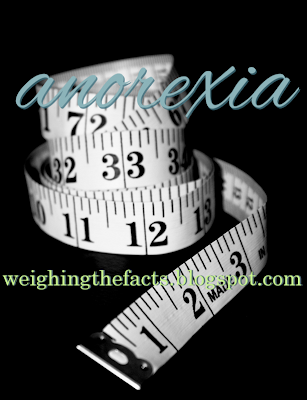
"In the wild ride that is life, some of us seek to find control in food. We use it to make ourselves feel better or worse. We restrict. We binge. We purge. We deprive. We use. Why food? Well, that’s the question, isn’t it?"
"There were times in my life I fasted for days, consuming nothing but water or diet Coke ... Sometimes, as I went between wanting to recover and wanting to wallow in my disease, I’d eat one meal a day—dinner—which was not nearly enough to satisfy my deprived body and mind. I remember summers of living on rice cakes at night after a 12 hour day of work. I did not have a good relationship with food." These are the words of Arielle Lee Becker, a young woman who's blog is an inspiring testament to her recovery from Anorexia .
"I came to a crossroads," she says in her blog entry, Fighting, Facing--and Finally Embracing--Food. "I really wanted to recover. Really wanted to be all right. Really really wanted it. Wasn’t just wishing, wasn’t just hoping—I was willing to do something about it. I was willing to work, to learn, to try."
"I got good at just saying 'No. ... When I’d feel that familiar grip of anorexia, I’d say, 'No.' Figuratively, literally, whatever it took. I was bold with myself—with my disease. I did not take shit ... It takes a lot of willpower. More willpower than it takes to starve."
"I wrote. Daily. I used my writing to help me, to save me, to direct me. ... In the process I learned about myself, sought to love myself, wrote about my pain and my feelings, wrote about my struggles. I began to feel better. I began to stop counting. This was tough—to forget about sizes, forget about calories, forget about a number on a scale."
Arielle writes about giving up her scale, "...you have to work at it. You have to be strong and not allow yourself to give in. And in time you will be okay. You won’t be a slave to a device that conquers your mood and your sense of well-being. And let me tell you, without a number to dictate your daily mood, you begin to listen to yourself and to how you feel without that number. You know yourself as you never knew her before. You feel good. You feel free. You begin to finally see that you feel so good that there is no way you’d ever want to go back to that dark, horrible place you were before."
"I gained weight, but instead of being horrified by the way I looked, I appreciated the curves that were slowly showing themselves. The mirror was—strangely, I thought—more of a friend to me when I had put on some pounds than it was when I was sickly thin and longing to be thinner."
"The right path is never the easiest one, you know," she writes, "And the more you struggle, the better you will feel when you’ve overcome what it is that is bringing you down. In essence, everything worth fighting for starts with a struggle. And believe me, your health and your happiness are definitely worth fighting for."
"Listen to your soul...................... It's all about empowerment!"
To read the above in full, plus more of Arielle's inspiring writings and poetry, visit her blog: Actively Arielle: A voice with a Commitment.
Sources: http://tearstowords.blogspot.com/



 2
comments
2
comments




























